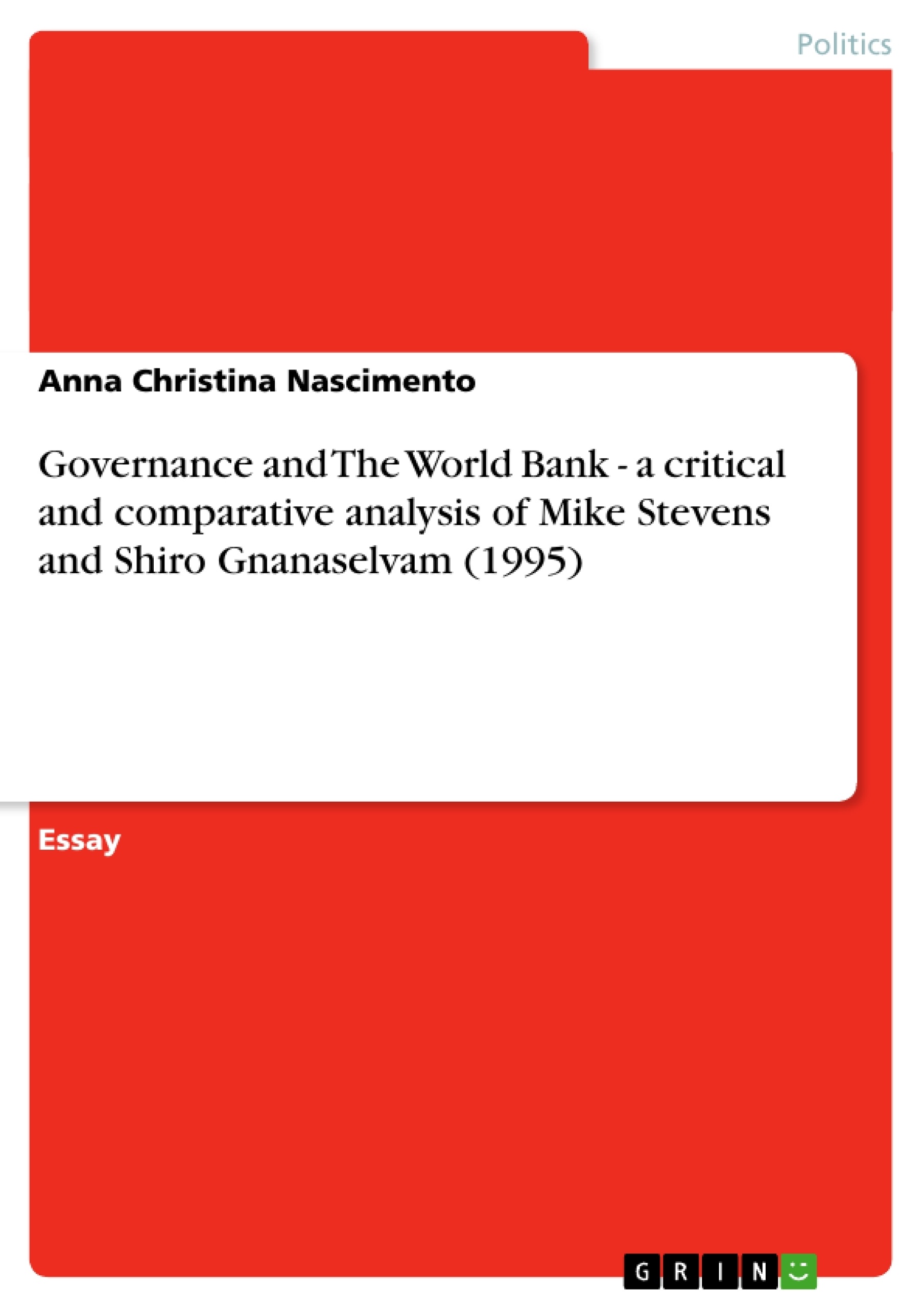The World Bank’s activities throughout the world are a recurrent object of analysis. This can be explained, in great scale, due to the importance and impact of the Bank’s policies and recommendations upon local societies and governments.
The World Bank mandate is clearly restricted to the economic and financial aspects of government. Based on this, the Bank assumes an official neutral position in regard to internal politics of all countries with which it works, as presented on the article of Stevens and Gnanaselvam. However, several scholars, such as Williams and Young, argue that such neutrality is difficult, because any policy proposed by the Bank is based on pre-established premises, which are based on liberal ideals, which end up been forced upon the countries that want to receive a Bank’s loan.
This paper will present both perspectives and apply the concepts discussed on an empirical case, in order to allow the evaluation of which perspective is more coherent with real cases.
Inhaltsverzeichnis (Table of Contents)
- Introduction
- Conceptual Framework
- Impartiality of World Bank's policies
- Governance as a liberal based concept
- Practical case: The World Bank in Brazil
- Conclusions
Zielsetzung und Themenschwerpunkte (Objectives and Key Themes)
This paper analyzes the World Bank's role in development, focusing on the debate surrounding the neutrality of its policies and the influence of its theoretical perspective on funded projects. It examines whether the Bank's policies are truly impartial or whether they are biased towards liberal ideals, imposing them on recipient countries. The paper utilizes empirical evidence to evaluate the coherence of both perspectives.
- The World Bank's activities and their impact on local societies and governments
- The debate surrounding the neutrality of the World Bank's policies
- The influence of liberal ideals on the Bank's policies and their potential for imposing these ideals on recipient countries
- The concept of governance and its role in development
- The relationship between good governance and economic development
Zusammenfassung der Kapitel (Chapter Summaries)
- Introduction: This chapter introduces the topic of the World Bank's activities and their impact on local societies and governments. It highlights the debate surrounding the neutrality of the Bank's policies and whether they are influenced by liberal ideals.
- Conceptual Framework: This chapter explores the concept of governance and its increasing importance in the activities of international development organizations. It defines governance according to the World Bank's definition and discusses its three key aspects: political regime, authority exercise, and government capacity. The chapter also emphasizes the link between governance and development, arguing that sound government is crucial for economic growth.
Schlüsselwörter (Keywords)
The paper focuses on the World Bank's role in development, examining the concepts of governance, neutrality, liberal ideals, and the impact of these concepts on the Bank's policies and their implementation in recipient countries. It explores the relationship between good governance and economic development, drawing upon relevant research and case studies.
Frequently Asked Questions
Is the World Bank truly neutral in its policies?
While the World Bank maintains an official neutral position, critics argue its policies are heavily influenced by liberal economic ideals.
What is the World Bank's definition of governance?
Governance is defined through three aspects: the political regime, the exercise of authority, and the government's capacity to manage resources.
How do liberal ideals affect funded projects?
Scholars argue that pre-established liberal premises are often forced upon countries seeking loans, impacting their internal socio-economic structures.
What practical case is examined in this paper?
The paper uses the World Bank's activities in Brazil as an empirical case study to evaluate the coherence of theoretical perspectives.
What is the link between governance and development?
The Bank argues that sound government and 'good governance' are crucial prerequisites for sustainable economic growth.
- Citation du texte
- Bachelor in International Relations Anna Christina Nascimento (Auteur), 2006, Governance and The World Bank - a critical and comparative analysis of Mike Stevens and Shiro Gnanaselvam (1995) , Munich, GRIN Verlag, https://www.grin.com/document/78497



